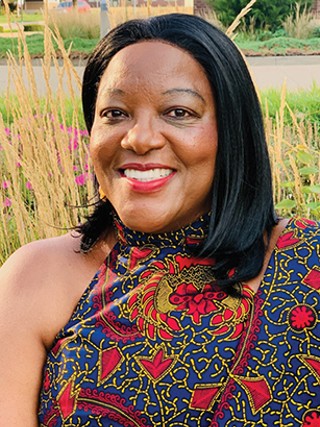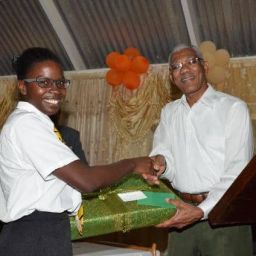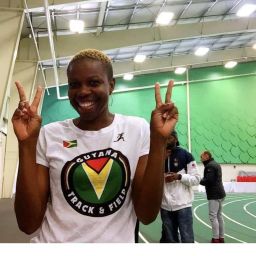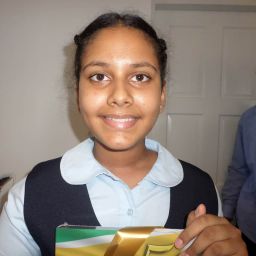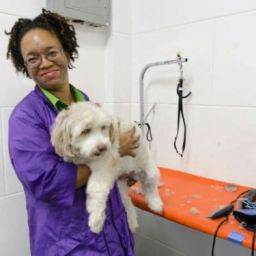June Wood Agamah moved to Springfield in 1995 with her husband, Dr. Edem Agamah, and their three young daughters. It’s a long way from her Guyana homeland – where she was called Caryl. Edem was born in Ghana. Frequently Americans assume they are from the same country. They were born nearly 4,000 miles and an ocean apart. Guyana is on the northern coast of South America and Ghana on the western coast of Africa.
June and Edem have a deep faith and feel guided by God in their life’s journey. They’ve led 37 mission trips to Ghana, training volunteers months in advance of the biannual trips. Their daughters accompanied them from a young age and experienced Ghana’s culture and people. Yet, June’s homeland was mostly a mystery. In 2014, middle daughter Aseye delved into a closet looking for old photos of her mother to make a collage for her mother’s birthday. Aseye found no baby picture, as none were taken. However, she describes finding a treasure-trove of photos of a “beautiful, trendy 20-something-year-old” and extraordinary journals. This led to a litany of questions about her mother’s life. June admitted she had either consciously or unconsciously blocked out her past. Now Aseye was hungry to understand her mother’s childhood, native country, and her own identity.
This was the impetus for June to open her heart and write Caryl’s Closet, which she completed during the 2020 pandemic. She poignantly describes her family’s character traits of hard work, enduring faith, long-suffering determination, and perseverance. June divulges her personal journey growing up in a tiny village, Buxton-Friendship, on the east coast of Demerara in Guyana, and ultimately immigrating to America. She paints a vivid picture of growing up poor with extraordinarily hardworking and loving parents. June has four older siblings and a sister a decade younger. June reveals her country’s history and why the Buxton-Friendship people are renowned for their determination and grit.
After years of grueling jobs in sugar cane fields and the construction industry, her father was out of work. Guyana was in acute economic decline. Her mother had suffered a stroke. In 1983, her father and mother risked everything to leave Guyana with their youngest daughter to make a better life in America. Immigration laws prevented June and her older siblings, who were no longer minors, from joining them. The intent was to apply for them to come later. Two months after moving to Slidell, Louisiana, near New Orleans, June’s mother died of a heart attack. June was in Barbados, where she had moved to look for work. The news was gut-wrenching. June went to New Orleans to be with her father. This was the beginning of navigating the immigration system and starting her new life in America.
June enrolled at the University of New Orleans. During her first class, she was called June, since Caryl is her middle name. From then on, Caryl became June. June met her future husband through a mutual friend who wanted to introduce her to a physician, who the friend mistakenly thought was from June’s home country. He had a degree from the University of Ghana Medical School in Accra and was teaching and attending graduate school at Louisiana State University. June writes about their first meeting and short courtship. They married in 1988. June earned a B.A. from the University of New Orleans and started graduate school. In 1990 they moved to Evanston, Illinois, where Edem had a residency in internal medicine at St. Francis Hospital. From there Edem had a fellowship in oncology/hematology at the University of Chicago. They moved to Hyde Park, and June worked at Aurora University. By then they had three children under the age of five.
In 1995 the Agamahs relocated to Springfield, a stark contrast from Hyde Park, a hometown for people from all over the world. Edem joined the Central Illinois Hematology Oncology Center. There were three major hospitals in Springfield at the time and only a handful of Black physicians and professionals. June writes in Caryl’s Closet that they “were to learn the difficult art of transcending yet owning our identity as minorities.” She describes her experiences and those of her daughters growing up in Springfield and navigating in predominately white spaces.
Access to quality health care is a priority for June and a personal issue. Her mother did not have access to health care when she died. Mission trips to the Volta region of Ghana are a passion for the Agamahs. Since 1996 June has been the logistics coordinator for International Health and Development Network, a nonprofit organization established to help poor villages in the developing world. In addition to coordinating mission trips, June raises funds to help thousands of people get access to health care. June attended night classes, graduating from the University of Illinois Springfield in 2001. She discovered she could apply what she learned on the ground in Ghana. In 2006 the Agamahs purchased 23 acres of land to build the International Health and Development Network Mission Hospital, which now serves 30,000 patients annually.
By unpacking her closet and writing her memoir, June reveals the importance of family, faith, heritage, and caring for others. She has witnessed culture gaps firsthand. She writes that people don’t take time to get to know each other, and many Americans lack exposure to other cultures. By writing this book, her hope is for readers to look at immigrants with new eyes. “When the world tries to keep us in its mold, we too can break out with the unvarnished truth that unconditional love will always prevail in the end.” Connecting with others through forgiveness, gratitude, kindness, and love is her life’s purpose that she wants to pass on to others in her sphere of influence.
Karen Ackerman Witter was inspired to read Caryl’s Closet after hearing June Wood Agamah speak at a meeting of the Sunrise Rotary Club. She looks forward to being within June’s sphere of influence.
Illinois Times has provided readers with independent journalism for more than 40 years, from news and politics to arts and culture. Now more than ever, we’re asking for your support to continue providing our community with real news that everyone can access, free of charge. We’re also offering a home delivery option as an added convenience for friends of the paper.
Click here to subscribe, or simply show your support for Illinois Times.
Click here to view the original article at www.illinoistimes.com


